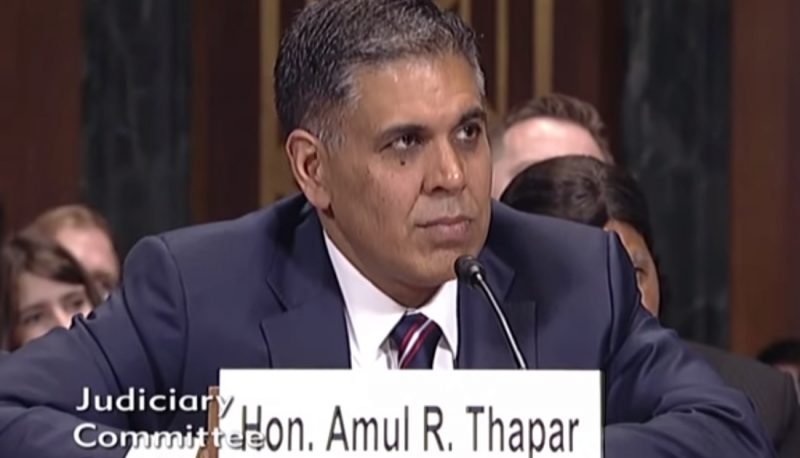“Confirmed Judges, Confirmed Fears” is a blog series documenting the harmful impact of President Trump’s judges on Americans’ rights and liberties.
Trump judge Amul Thapar wrote a 2-1 November decision in Johnson v. Ohio Dep’t of Public Safety that affirmed the dismissal of an African American state trooper’s racial workplace discrimination claim. As the dissenting judge pointed out, Thapar misinterpreted the burden of proof in a case where there is no “smoking gun” explicit evidence of race discrimination, which threatening to make it much harder for people of color to prevail in such cases.
Under well-settled Supreme Court doctrine established more than 40 years ago in McDonnell Douglas v. Green, when a person believes that they have experienced racial workplace discrimination, they need not provide direct proof that race was a factor in the employer’s decision-making, since employers rarely admit such discrimination. Instead, they can establish what is called a prima facie case by demonstrating that they belong to a protected class (based on race, ethnicity and national origin, among others), and suffered an adverse employment action despite being qualified for the job, and that someone outside of their protected class was “treated more favorably.” The burden then shifts to the employer to prove a legitimate, non-discriminatory reason for the differential treatment, which will prevail unless the individual can prove that the reason was in fact a pretext.
Morris Johnson, an African American state trooper, was fired for conduct unbecoming an officer after he committed “harassing” conduct against women that included attempting to develop a relationship with a woman he pulled over for possibly driving while intoxicated. He contended he was discriminated against, however, because a white officer who had engaged in comparable misconduct was only suspended and not fired.
A district court dismissed Johnson’s claim on summary judgment, ruling that he had not even proven a prima facie case under McDonnell Douglas. Thapar agreed in a 2-1 decision on appeal, pointing out that there were many factual differences between Johnson and the white officer, including the fact that Johnson had previously committed a similar offense and had agreed not to repeat such misconduct for at least two years.
Judge Karen Nelson Moore strongly dissented, despite Johnson’s troubling conduct, because Thapar’s opinion significantly “restricts our precedent” in discrimination cases. “For over twenty years,” she explained, the 6th Circuit had ruled that in order to demonstrate a prima facie case, a discrimination plaintiff like Johnson need only identify a white employee who is comparable to him in “all relevant respects” but was treated differently by the employer. She went on to demonstrate that Johnson and the white officer were comparable in relevant respects, including being subjected to the same standards, disciplined under the same rule, and found to have abused their authority through harassing conduct against women they encountered as part of their duties.
Judge Moore criticized the majority for deciding that Johnson did not prove a prima facie case because of the many factual differences between him and the white officer. Requiring a plaintiff like Johnson to prove similarity “in all respects,” she explained, would “mean that any unique circumstances would foreclose a plaintiff from bringing a meritorious claim” and would “stymie” many discrimination victims at an early stage of a case. Factors like Johnson’s previous misconduct were certainly relevant and could be used by the police to demonstrate a legitimate non-discriminatory reason why Johnson and the white officer were treated differently, she pointed out. But they should not prevent someone like Johnson from establishing a prima facie case, she emphasized, which the 6th Circuit had ruled was a “burden easily met.” The case should have been sent back to the lower court, Judge Moore noted, so that Johnson would at least have the opportunity to demonstrate that the department’s reason for distinguishing between the two officers was a pretext for discrimination.
This case is not the first time that Trump judges have misinterpreted the law and made it much harder for possible discrimination victims to prove their case. In one decision, Trump judges on the 11th Circuit similarly ruled that an African American female police officer in Georgia had not established a prima facie case, which the dissent explained had “drop[ped] an anvil” on the scale of justice to harm workers’ job bias claims. Future cases will tell us more about the potentially widespread harmful effects of Thapar’s decision.

